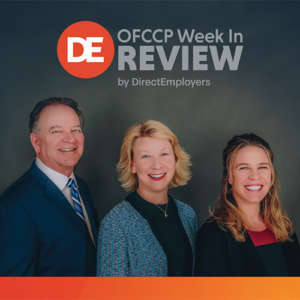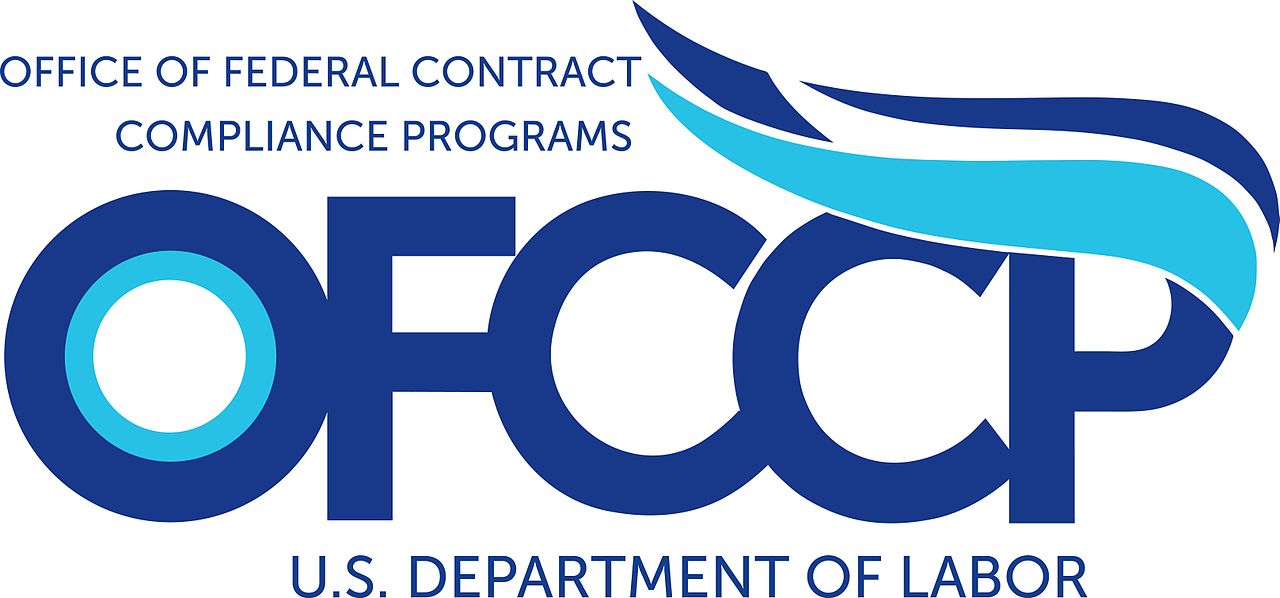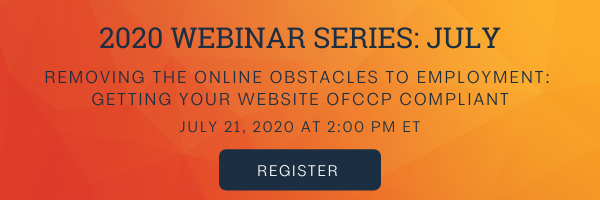
- Federal Contractors – Get Ready for Promotion and Accommodation Focused Reviews!
- Director Leen Cajoled Contractors to Make Their Recruitment Websites Accessible
- Director Leen Reported Technical Assistance for Contractors
- Director Leen Promised OFCCP Efforts to Connect HBCUs, HACUs, and TCUs to Government Contractors
- Director Leen Again Hawked Functional Affirmative Action Programs, Despite Declining Contractor Enrollments in the Program
- Director Leen Reported Faster Progress on Open Audits due to OFCCP’s Response to COVID-19
- Questions and Answers with OFCCP Director Leen
- President Proclaims July as Pledge to America’s Workers
- EEOC Announced Pilot Programs to Increase Voluntary Resolutions
- President Creates Initiative to Support Hispanic Americans
Monday, July 6, 2020: Federal Contractors – Get Ready for Promotion and Accommodation Focused Reviews!

The progress, current projects, and future goals of OFCCP filled up Leen’s nearly two-hour speech. Three main categories summarize his topics.
- OFCCP’s efforts to combat systematic discrimination
- How OFCCP has responded to COVID-19
- Other programs (including Focused Reviews)
Most noteworthy were these announcements:
- Regular inclusion of Section 503 Focused Reviews with each CSAL, Upcoming Promotion Focused Reviews (no date; no Scheduling Letter yet)
According to Leen, “Compensation issues are failure to promote issues.” Expect to see guidance soon. [This is more confirmation that the Trump OFCCP, like the Obama OFCCP, is not finding a large number of contractor establishments with similarly situated women paid less than similarly situated men],
- Plans to explore and implement Focused Reviews on accommodations for both disabilities and religious reasons (no dates set),
- VEVRAA Focused Reviews audit Scheduling Letters are stamped and ready to send in the coming weeks. See WIR November 2019,
- Future OFCCP Executive Order 11246 audits to include sexual orientation and gender identity discrimination.
Monday, July 6, 2020: Director Leen Cajoled Contractors to Make Their Recruitment Websites Accessible

Additionally, although the Agency has no authority over the technical aspects of an accessible website, OFCCP claims to have jurisdiction under Section 503 and VEVRAA to require an accommodation statement on an online application system (41 CFR §60-741.21(a)(6)(iii) Prohibitions & 41 CFR §60-300.21(f) Prohibitions). Particularly shocking are the results reported from a recent USDOL Office of Disability Employment Policy (“ODEP”) survey from Westsat that reports that only 39% of federal Contractors have an accessible application system (see diagram excerpt below). See also, WIR June 2020.
Page 3 of Implementation of Disability-Inclusive Workplace Policies and Practices by Federal Contractors and Non-Federal Contractors
NOTE: DirectEmployers is hosting a free webinar on July 21, 2020, at 2:00 PM EST that can aid in understanding this very topic!
Monday, July 6, 2020: Director Leen Reported Technical Assistance for Contractors

Contractor Assistance Portal. Leen reported the Agency has responded to 36 of the 69 inquiries submitted through the portal. In addition, the Agency has responded to 867 of the 887 written questions, and the help desk has managed 2,537 calls this Fiscal Year. Director Leen was quick to reiterate that inquiries do not, and cannot trigger an audit! See WIR August 2019.
Monday, July 6, 2020: Director Leen Promised OFCCP Efforts to Connect HBCUs, HACUs, and TCUs to Government Contractors

Hispanic American Colleges and Universities (HACU) & Tribal Colleges & Universities (TCU). Expect to see initiatives with these schools as well. These schools are also a great place to conduct outreach, even if organizations have to do it virtually.
Monday, July 6, 2020: Director Leen Again Hawked Functional Affirmative Action Programs, Despite Declining Contractor Enrollments in the Program

Monday, July 6, 2020: Director Leen Reported Faster Progress on Open Audits due to OFCCP’s Response to COVID-19

Expect a full report to come with the Agency’s compliance evaluation statistics after the close of its Fiscal Year 2020 (which occurs on September 30, 2020). OFCCP’s new Fiscal Year 2021 will begin October 1, 2020.
Monday, July 6, 2020: Questions and Answers with OFCCP Director Leen

Q: Will there be another CSAL this year?
A: Not sure yet, but possibly by the end of the Fiscal Year (September 30, 2020) for Supply and Service Contractors.
Note: Director Leen expects a CSAL for Construction Contractors (Compliance Checks and possibly Compliance Reviews) by the end of FY20 or the beginning of FY21.
Q: What is the current headcount at OFCCP?
A: A little fewer than 450 OFCCP employees, but the Agency expects to hire externally to increase its headcount (OFCCP is authorized to employ up to 500 employees).
Q: What “accommodation statement” verbiage does OFCCP recommend contractors use? Phone number? E-Mail?
A: Great question, the Agency will work with ODEP to get some sample verbiage for Contractors. The verbiage should be easily seen, and it needs to be very clear on who to call or where to go for assistance (and candidates should get an “immediate response”).
Director Leen stated he believes career sites should be “fully accessible, so it’s not a barrier to employment.”
Note: For career site accessibly help, contact DE’s recruitment microsite subsidiary Recruit Rooster.
Monday, July 6, 2020: President Proclaims July as Pledge to America’s Workers

The President states, “It is critical that we explore and promote non-traditional pathways to family-sustaining careers, including through enhancing data transparency that can help match workers with available jobs; modernizing candidate recruitment, hiring, and training practices; and advancing lifelong learning opportunities. By broadening our vision for America’s workforce and igniting ingenuity and innovation, we can bring opportunity and prosperity to all Americans.”
Tuesday, July 7, 2020: EEOC Announced Pilot Programs to Increase Voluntary Resolutions
The Equal Employment Opportunity Commission (EEOC) announced the expansion of its mediation and conciliation processes with two six-month pilot programs. These pilot programs seek to expand opportunities for parties to voluntarily resolve charges through mediation and increase the effectiveness of the conciliation process.
Pilot Program #1: Mediation Expansion
The EEOC’s mediation process is a voluntary, informal, and confidential way to resolve disputes with the help of a neutral mediator trained to help employers and employees discuss their differences. Implemented in 1999, the current program only allows certain categories of charges to pursue mediation. The pilot program, which started Monday, July 6, 2020, “expands the categories of charges eligible for mediation and, generally, allows for mediation throughout an investigation.”
Note: The EEOC does not provide specifics on the types of charges currently available for mediation and similarily has not identified which kinds of charges will be available under the new Pilot Program. The current EEOC FAQ page on mediation states:
Q: Are all charges eligible for mediation?
A: No. The EEOC evaluates each charge to determine whether it is appropriate for mediation considering such factors as the nature of the case, the relationship of the parties, the size and complexity of the case, and the relief sought by the charging party. Charges that the EEOC has determined to be without merit are not eligible for mediation.
Note: Beginning in the Bush Administration (the father), the EEOC began to internally rank incoming charges as “A,” “B,” or “C.” “C” charges were non-meritorious (typically about 80% of the EEOC’s charge inventory) and are typically not investigated. [The EEOC, unlike OFCCP, has no legal duty to investigate incoming charges and, in fact, investigates only a very small percentage of its charge inventory]. “A” charges are those appearing at intake as likely to be litigation worthy, and are almost always investigated. However, the Commission usually withholds them from mediation because the Commission views them as strong claims for which it usually wants full remedies. “B” charges are claims that could be meritorious depending on the outcome of the Commission’s investigation and are usually available for mediation.
Pilot Program #2: Conciliation Expansion
The EEOC is statutorily required to attempt to resolve findings of discrimination through “informal methods of conference, conciliation, and persuasion.” See 42 U.S.C. 2000e-5. The EEOC’s conciliation pilot, which began on May 29, 2020, adds a requirement that the appropriate management level approve the conciliation offers before they are shared with respondents. This additional step hopes to drive accountability and is part of a broader effort the Commission claims will emphasize the importance of conciliation as a tool to remedy discrimination complaints.
Thursday, July 9, 2020: President Creates Initiative to Support Hispanic Americans

- identify and promote educational and workforce development practices that have improved educational, professional, and economic outcomes for Hispanic Americans, and
- encourage private-sector initiatives and foster public-private partnerships that improve access to educational and economic opportunities for Hispanic Americans.
U.S. Secretary of Labor Eugene Scalia stated,
“President Trump promised to support American workers of all backgrounds, and to open new pathways to good paying careers. This Executive Order, establishing the White House Hispanic Prosperity Initiative, will expand access to education and the skills needed to work jobs in growing sectors of the economy.”
THIS COLUMN IS MEANT TO ASSIST IN A GENERAL UNDERSTANDING OF THE CURRENT LAW AND PRACTICE RELATING TO OFCCP. IT IS NOT TO BE REGARDED AS LEGAL ADVICE. COMPANIES OR INDIVIDUALS WITH PARTICULAR QUESTIONS SHOULD SEEK ADVICE OF COUNSEL.
SUBSCRIBE.
Compliance Alerts
Compliance Tips
Week In Review (WIR)
Subscribe to receive alerts, news and updates on all things related to OFCCP compliance as it applies to federal contractors.
OFCCP Compliance Text Alerts
Get OFCCP compliance alerts on your cell phone. Text the word compliance to 55678 and confirm your subscription. Provider message and data rates may apply.


